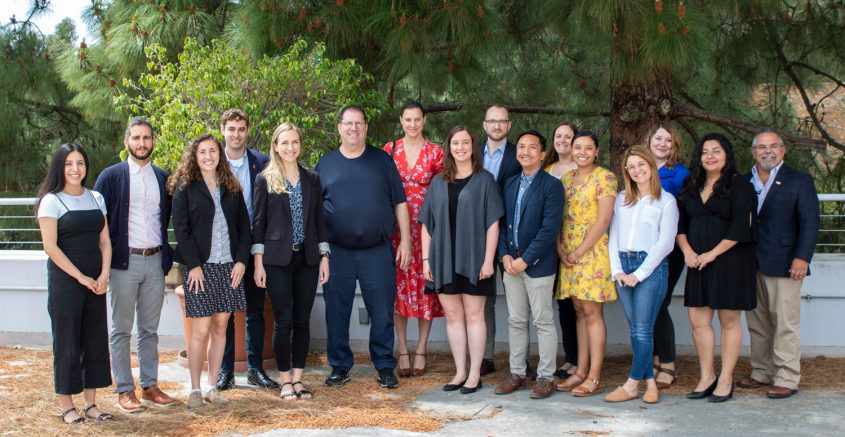
In Support Gifts and new initiatives focus on equality, patient care, gay sexuality, research and public discourse
SHAPIRO FAMILY GIFT PROMOTES SOCIAL WORK WITHIN SPECIAL PATIENT CARE SETTINGS
A new three-year special patient care fellowship has been created thanks to a generous gift from UCLA Luskin Advisory Board member Peter Shapiro and the Shapiro family.
Field education is a critical component of the master of social welfare, and promoting collaborative engagement between UCLA Luskin Social Welfare and local social work agencies is vital to the education process. The degree program relies heavily on experiential learning through partnerships with community agencies, producing practitioners with real-world experience.
Personal experience helped motivate Peter Shapiro and the Shapiro family to build an interdisciplinary learning experience for social welfare students interested in serving the special patient care population. One of the Shapiro children has cerebral palsy, and her light has been a source of inspiration within the family — the Shapiros hope their gift will share her light and life experiences with many others.
Previously, the Shapiros have supported UCLA Dentistry’s Special Patient Care Clinic and UCLA cerebral palsy clinics, and they have built solid relationships with leading faculty members and patient providers. The new fellowship is a perfect fit for the Shapiros to establish an interdisciplinary collaboration that will provide UCLA Luskin social workers with an opportunity to serve patients within those clinical settings.
Their funding will support a part-time contract staff supervisor position and two second-year social work students each year for three years.
The contract social work supervisor position is designed to be two days per week, with one day spent assisting Dr. Eric Sung and his team in providing comprehensive care for patients and families of the UCLA Dentistry Special Patient Care Clinic. The other day would be spent assisting Dr. Rachel Mednick Thompson with her pediatric cerebral palsy patients at a clinic for the Orthopaedic Institute for Children in downtown Los Angeles.
The Luskin School connection has come full circle, with alumna Michael O’Hara MSW ’14 having recently taken on this role.
One of the two Shapiro student fellows will conduct their field placement three days per week within the dentistry clinic, with a fourth day in the cerebral palsy clinic. They will receive field education credits toward completion of their MSW degrees.
The second Shapiro fellow would conduct their field placement three days per week with Mednick Thompson at the Center for Cerebral Palsy, supporting pediatric and adult patients at her weekly clinic in Santa Monica.
The UCLA Luskin Development team views privately funded student fellowships and support as among the most effective means of attracting the world’s brightest students to fields that profoundly impact local communities and lives.
GIVING BACK THROUGH DISCOURSE: THE ROB SCHILLING SERIES ON INEQUALITY
Professor Emeritus of Social Welfare Robert Schilling and his wife, Sheryl Miller, donated $25,000 in December to establish the Rob Schilling Series on Inequality at UCLA Luskin.
“Given the times we live in, it is not difficult to ponder themes, hardly original, that demand our attention,” Schilling said about the gift.
The gift agreement lists potential topics and themes for the lecture series to include inequality that relates to race/ethnicity, gender, class and geography; social determinants of infectious and chronic disease, from domestic and international perspectives; imagining health care in 2021 and beyond; reinventing child welfare policy; changing criminal justice in the world’s most incarcerated nation; and the disappearance of work and solutions to employment woes.
In light of the ongoing pandemic, the donors have asked that these funds be allocated to the School in an unrestricted manner until such time that in-person events resume without COVID-19 restrictions.
Personal experience motivated the gift. One of the first positions held by Schilling was as a social worker at a United Way-supported child welfare agency, and it seemed entirely reasonable to him that those whose salaries were in part paid for by community giving should also feel compelled to contribute to the United Way.
Likewise, in his roles as a clinical faculty member at the University of Washington, Columbia University and UCLA, it seemed only right to Schilling and his wife for them to participate in the annual development campaigns at those institutions.
Schilling also drew inspiration from his father, an alumnus and faculty member at the University of Wisconsin and the co-founder of the Wisconsin Medical Alumni Foundation, who gave generously to an institution that had provided so much to him.
Schilling and Miller chose to create a lecture series after reflecting on the stimulating guest lectures they attended at the Luskin School and other parts of UCLA. Although the needs of the School are many, they felt the time was right to focus on the intellectual conversation within UCLA Luskin.
The donors said they hope their gift will enable UCLA Luskin Social Welfare to actively pursue lectures of significance to the educational experience of all units at the Luskin School.
GAY SEXUALITY AND SOCIAL POLICY INITIATIVE LAUNCHES
As COVID-19 continued to disproportionately impact communities at the intersection of multiple vulnerabilities across the world, the UCLA Hub for Health Intervention, Policy and Practice (HHIPP) continued to produce knowledge to improve health outcomes among these groups and bring about positive social change.
This year, UCLA HHIPP also committed to a new undertaking: the Gay Sexuality and Social Policy Initiative @ UCLA Luskin, or GSSPI.
Seventy countries across the world still criminalize homosexuality, enforcing laws and policies that overwhelmingly target same-sex sexual behavior among men. In collaboration with global gay communities, GSSPI was launched to conduct cutting-edge research relating to gay male sexuality and the unique experiences of gay men related to sex.
The new initiative seeks to prioritize research about gay male sex today, 40 years after researchers and policymakers largely failed to take up the mantle at the beginning of the HIV epidemic. Instead, GSSPI founders say that gay sex was de-prioritized in sexual health research and left out of interventions to improve sexual health among gay men, which only increased health risks and further fostered shame and stigma.
As noted on the GSSPI website, specific U.S. policies such as the Helms Amendment from 1987 exclude gay sex from public health initiatives and withhold funding for activities that explicitly address gay sex.
UCLA Luskin Development officials are seeking philanthropic support for GSSPI as an investment that will help increase the effectiveness of ongoing efforts to improve the quality of life for gay men around the world. Potential donors to GSSPI may contact Ricardo Quintero at rquintero@luskin.ucla.edu for
more information.
ITS LAUNCHES STUDENT AWARD FOR TRANSPORTATION EQUITY AND JUSTICE
The UCLA Luskin Development team recently assisted the UCLA Institute of Transportation Studies in launching a crowdfunding campaign for a new Excellence in Transportation Equity and Justice Capstone Prize in support of students conducting impactful research to advance transportation equity and justice.
“Understanding systems of injustice is critical because of the long-lived nature of our work,” said Isabel Cardenas, who was involved in the effort as a second-year MURP student and also served as co-chair of the Women’s Transportation Seminar and co-founder and facilitator of the Disability Club. “Without centering racism, sexism and ableism, we will continue to produce systemic injustice and harm vulnerable communities for decades. There is urgent need to prioritize equity and justice in transportation planning, research and education, and this capstone prize will move us forward in all three areas.”
Almost $15,000 was raised through a matching gift from Tim Papandreou MA UP ’04. He is a member of the ITS Board of Advisors and founder of Emerging Transport Advisors, where he prepares clients for changes impacting the transportation industry through shared, electric and automated mobility options.
Each year, ITS will award the new prize to a student whose work best advances transportation equity and justice through a combination of intellectual merit and the potential for broader impacts.
“Representation matters in transportation equity and justice,” said Professor Brian D. Taylor, director of ITS. “These structural injustices result from a lack of representation of those who have been marginalized in transportation decision-making.”
Interested in learning more? Contact Laura Scarano, associate director of development, at lscarano@luskin.ucla.edu.
DEVELOPMENT TEAM WORKS DIRECTLY WITH FACULTY SEEKING FUNDING
Nicole Payton and Ricardo Quintero of the Development Office held office hours virtually this academic year for faculty interested in pursuing funding for their various projects and research as part of a philanthropic effort in cooperation with colleagues from the UCLA Office of Corporate, Foundation and Research Relations.
The team helps connect UCLA Luskin faculty with local, regional and national foundations, or with individual donors who may want to invest in their work.
Grants that are awarded to faculty often depend on understanding a nuanced process that varies from foundation to foundation. The Development officials coach faculty members on strategy and how to think from a foundation perspective when seeking funding or answering requests for proposals, or RFPs.
Faculty save time and effort through UCLA Luskin’s guidance on best approaches and knowledge of a foundation’s grant management process.
The team plans to continue working with faculty and the Luskin School’s research centers and institutes to build ongoing relationships and expertise when operations normalize after the pandemic.
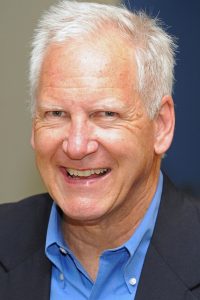

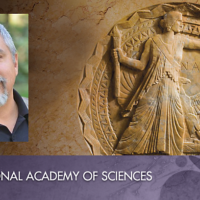
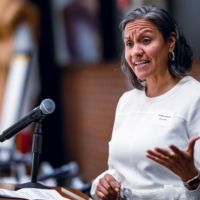

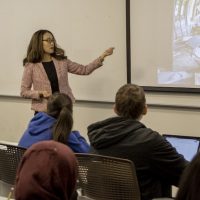




Leave a Reply
Want to join the discussion?Feel free to contribute!